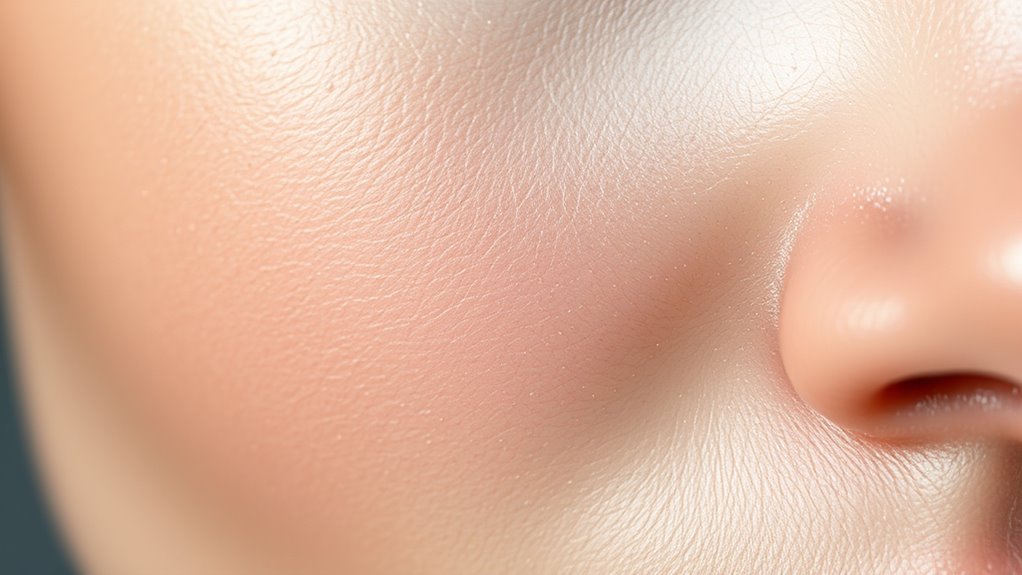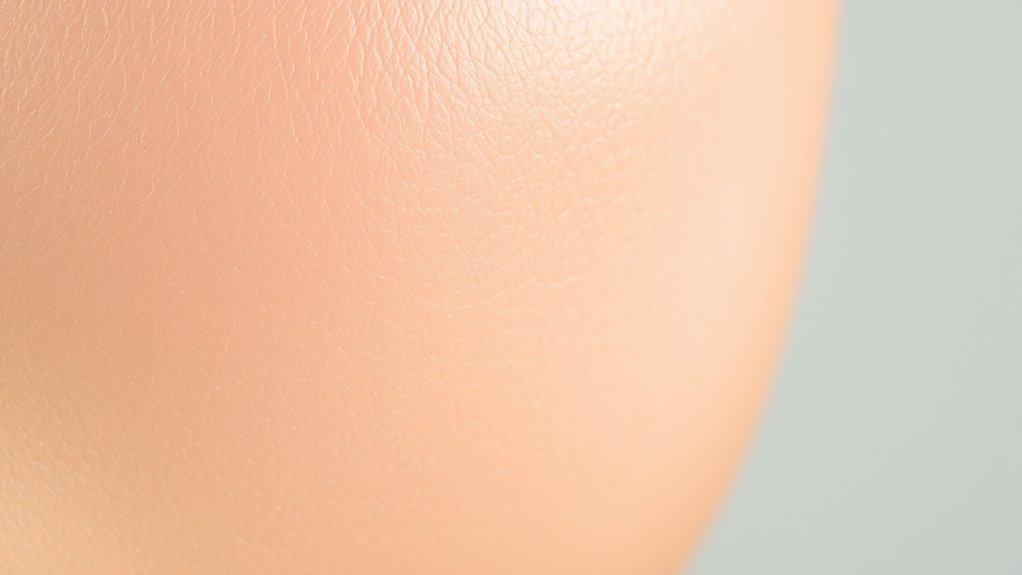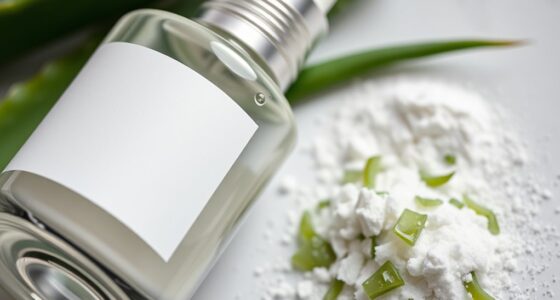Your skin’s barrier protects you from pollutants, irritants, and moisture loss. It acts like a shield, keeping harmful elements out and hydration in. To support it, use gentle, barrier-strengthening ingredients like ceramides, hyaluronic acid, and fatty acids, while avoiding harsh chemicals and alcohols. Consistent moisturization and avoiding over-cleansing help maintain its health. If you want practical tips on how to boost your skin’s resilience, there’s plenty more to explore.
Key Takeaways
- The skin’s barrier protects against pollutants, irritants, and moisture loss, essential for healthy, radiant skin.
- Ceramides, hyaluronic acid, and fatty acids support barrier rebuilding and resilience.
- Avoid harsh ingredients like alcohols and artificial fragrances that can weaken or damage the barrier.
- Consistent moisturizing and gentle cleansing help maintain and repair the skin’s protective layer.
- Using barrier-specific products and avoiding over-exfoliation promote long-term skin health.

Your skin’s barrier is your first line of defense against environmental damage, pollutants, and irritants. It acts as a protective shield, preventing harmful elements from penetrating deeper into your skin while keeping moisture in. When this barrier becomes compromised, it can lead to dryness, redness, sensitivity, and even increased susceptibility to infections. Understanding how to support and repair your skin’s barrier function is essential for maintaining healthy, radiant skin. One of the key ways to do this is by paying attention to moisturizer ingredients. The right ingredients can strengthen your skin’s protective layer, restore hydration, and promote resilience. Look for moisturizers containing ceramides, which are lipids naturally found in your skin that help rebuild the barrier. Incorporating ceramide-rich products into your routine can substantially improve your skin’s ability to retain moisture and resist irritants. Hyaluronic acid is another beneficial ingredient because it attracts and holds water, providing an additional layer of hydration that supports barrier repair. Fatty acids, such as those from plant oils or squalane, also play an essential role by replenishing the lipids that keep your skin resilient and plump. When choosing a moisturizer, prioritize formulas that focus on barrier repair rather than just superficial hydration. This means avoiding products with harsh alcohols, artificial fragrances, or irritating preservatives that can further weaken your skin barrier. Instead, opt for gentle, nourishing formulations designed to support the skin barrier function. Consistent application of a moisturizer that contains these key ingredients helps seal in moisture, shield your skin from external aggressors, and facilitate the natural repair process. It’s also important to recognize that your skin’s barrier function can be compromised by over-cleansing, environmental stressors, or excessive exfoliation, which strip away essential lipids and weaken the protective layer. Supporting your skin with the right moisturizer ingredients helps counteract these effects, fostering a healthier and more resilient barrier. Remember, your skin is dynamic and constantly changing, so what works today might need adjustment tomorrow. Prioritize products formulated specifically for barrier repair and pay attention to how your skin responds. Incorporating Pimple Patches into your routine can provide targeted treatment for active breakouts while supporting overall skin health. Over time, these habits will strengthen your skin’s barrier, reduce sensitivity, and enhance your skin’s overall health. By understanding the importance of moisturizer ingredients and supporting your skin barrier function, you’re taking a proactive step toward healthier, more protected skin every day.
Frequently Asked Questions
How Long Does It Take to Restore a Damaged Skin Barrier?
It typically takes about 4 to 6 weeks to restore a damaged skin barrier. During this time, your skin cell turnover accelerates as you consistently use effective moisturizers. These products help strengthen your skin’s protective layer, speeding up healing. Be patient and stick to a gentle skincare routine, as consistent moisturizer application improves barrier function and promotes healthier, more resilient skin over time.
Can Barrier Repair Products Be Used on Sensitive Skin?
Think of barrier repair products as a gentle shield for your skin. Yes, you can use them on sensitive skin, especially if you choose hypoallergenic formulas and fragrance-free options. These products are designed to soothe and strengthen without causing irritation. Always patch-test first, and opt for formulas that cater specifically to sensitive skin. With patience, you’ll help your skin rebuild its protective barrier safely and effectively.
Are Natural Remedies Effective for Barrier Repair?
Natural remedies like herbal remedies and topical oils can be effective for barrier repair, especially if you choose ingredients known for their soothing and healing properties. You’ll want to look for options such as aloe vera, chamomile, or coconut oil, which help strengthen and hydrate your skin’s protective layer. However, always patch-test new remedies to avoid irritation and consult with a dermatologist if your skin is particularly sensitive or damaged.
How Does Diet Influence Skin Barrier Health?
Your diet directly influences your skin barrier health by improving nutrient absorption and skin hydration. When you eat a balanced diet rich in vitamins, minerals, and healthy fats, you support your skin’s ability to repair and maintain its protective layer. Proper hydration from water and nutrient-rich foods keeps your skin supple, reduces dryness, and enhances barrier function. So, what you eat plays a crucial role in keeping your skin resilient and healthy.
When Should I See a Dermatologist for Barrier Issues?
Think of your skin as a fortress under siege; when sensitive skin concerns persist despite skincare routine adjustments, it’s time to see a dermatologist. If you notice persistent redness, burning, or irritation that won’t heal, don’t wait for the storm to pass. A professional can identify underlying issues and guide you toward targeted treatments, ensuring your skin’s protective barrier gets the repair it desperately needs.
Conclusion
So, there you have it. Keep your skin’s barrier intact, or face the horror of relentless dryness, irritation, and aging—because who needs smooth, healthy skin anyway? Remember, a little barrier repair every day keeps the dermatologist away (or at least makes them less necessary). So go ahead, pamper your skin, and thank yourself later when you’re not battling flaky, angry skin every time you wash your face. Happy barrier repairing!









